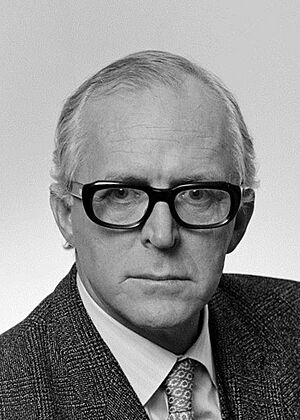Jim McClelland facts for kids
Quick facts for kids
Jim McClelland
|
|
|---|---|
 |
|
| Chief Judge of the Land and Environment Court of New South Wales | |
| In office 14 April 1980 – 2 June 1985 |
|
| Preceded by | New office |
| Succeeded by | Jerrold Cripps |
| Minister for Labor and Immigration | |
| In office 6 June 1975 – 11 November 1975 |
|
| Prime Minister | Gough Whitlam |
| Preceded by | Clyde Cameron |
| Succeeded by | Tony Street |
| Minister for Manufacturing Industry | |
| In office 10 February 1975 – 6 June 1975 |
|
| Prime Minister | Gough Whitlam |
| Preceded by | Kep Enderby |
| Succeeded by | Lionel Bowen |
| Senator for New South Wales | |
| In office 16 March 1971 – 21 July 1978 |
|
| Preceded by | James Ormonde |
| Succeeded by | Kerry Sibraa |
| Personal details | |
| Born | 3 June 1915 Melbourne, Victoria, Australia |
| Died | 16 January 1999 (aged 83) Wentworth Falls, New South Wales, Australia |
| Political party | Labor |
| Spouses |
Nora Fitzer
(m. 1947; div. 1968)Freda Watson
(m. 1968; died 1976)Gillian Appleton
(m. 1978) |
| Alma mater | University of Melbourne University of Sydney |
| Occupation | Solicitor, unionist |
James Robert McClelland (born 3 June 1915 – died 16 January 1999) was an important Australian figure. He was a talented lawyer, a politician, and later a judge. He was a member of the Australian Labor Party (ALP). He served as a Senator for New South Wales from 1971 to 1978. He also held important roles as a government minister in 1975. After his time in politics, he became the first Chief Judge of the Land and Environment Court of New South Wales. He also led a major investigation into nuclear tests in Australia.
Contents
Early Life and Education
Jim McClelland was born in Melbourne, Australia, on 3 June 1915. His father worked for the railways. Jim spent his early childhood in Melbourne before his family moved to Ballarat.
He attended St Patrick's College, Ballarat and later won a scholarship to St Kevin's College, Melbourne. His parents had different religious backgrounds, and he was raised in his mother's Catholic faith. He thought about becoming a priest but decided against it as a young adult.
In 1932, Jim won another scholarship to the University of Melbourne. He left for a short time to work as a clerk but later returned to finish his studies. He earned a Bachelor of Arts degree in 1936.
From Worker to Lawyer
After university, Jim worked as a labourer at a steel company. He joined a union, which is a group that protects workers' rights. He later served in the Royal Australian Air Force (RAAF) during World War II, from 1943 to 1946. He was stationed in Australia and New Guinea.
After the war, Jim moved to Sydney. He decided to study law at the University of Sydney. He graduated in 1950 and became a lawyer in 1951. He became very successful, especially in cases related to workers' compensation.
Political Career in the Senate
Jim McClelland joined the Australian Labor Party (ALP) in 1941. He first tried to enter parliament in 1966 but was not successful.
However, in 1970, he was elected to represent New South Wales in the Australian Senate. A Senator is a member of one of Australia's two main law-making bodies. He officially started his term in July 1971. He was also appointed earlier in 1971 to fill a vacant spot.
Ministerial Roles
During his time in the Senate, Jim McClelland held important roles in the government led by Prime Minister Gough Whitlam.
- From February to June 1975, he was the Minister for Manufacturing Industry. This role involved looking after Australia's factories and production.
- From June to November 1975, he became the Minister for Labor and Immigration. In this job, he was responsible for workers' rights and immigration matters. He also helped the Prime Minister with public service issues.
He was re-elected to the Senate in 1975. He resigned from the Senate in July 1978.
Later Life and Judgeship
In 1980, Jim McClelland was appointed as the very first Chief Judge of the Land and Environment Court of New South Wales. This court deals with important cases about land use and environmental protection. He held this position until he turned 70 in June 1985.
In 1984, as Justice McClelland, he led a special investigation called the McClelland Royal Commission. This commission looked into the British nuclear tests that had taken place in Australia, especially at Maralinga. This was a very important job, as it helped uncover the impact of these tests.
Personal Life
Jim McClelland married Nora Fitzer in 1947. They adopted two children. They divorced in 1968. Later that same year, he married Freda Watson, who had three children from a previous marriage. They were friends with the famous Australian author Patrick White. Freda passed away in 1976. In 1978, Jim married writer Gillian Appleton.
Jim McClelland spent his retirement years in Wentworth Falls, a town in the Blue Mountains. He passed away at his home on 16 January 1999, at the age of 83.
 | Mary Eliza Mahoney |
 | Susie King Taylor |
 | Ida Gray |
 | Eliza Ann Grier |

